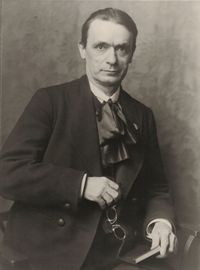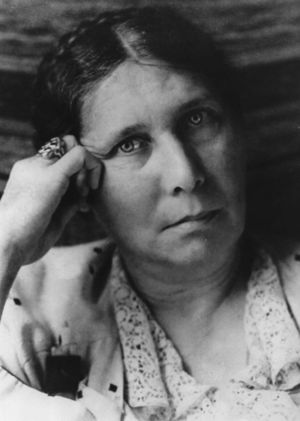Anthroposophic medicine: Difference between revisions
(Created page with "thumb|200px|[[Rudolf Steiner (1861-1925)]] thumb|[[Ita Wegman (1876-1943)]] '''Anthroposophical medicine''', or more pre...") |
No edit summary |
||
| Line 2: | Line 2: | ||
[[File:Ita Wegman.jpg|thumb|[[Ita Wegman]] (1876-1943)]] | [[File:Ita Wegman.jpg|thumb|[[Ita Wegman]] (1876-1943)]] | ||
''' | '''Anthroposophic medicine''', also '''anthroposophical medicine''' or more precisely '''anthroposophically extended medicine''', sees itself as an ''integrative medicine'' that combines conventional and alternative healing methods in a meaningful way for the benefit of the patient. In anthroposophy, conventional orthodox medicine is understood as limited and material-technical, but at the same time as a well-founded natural scientific basis, which, however, is to be supplemented by certain spiritual-scientific insights. "''It adds to the knowledge of the physical man, which alone can be gained by the natural scientific methods of the present day, that of the spiritual man.''" {{GZ||27|8}} | ||
[[Rudolf Steiner]] developed the theoretical-methodological foundations of anthroposophical medicine in 1920-1924 in numerous lectures for doctors and medical students (Volumes 312 -319 of the [[Rudolf Steiner's Collected Works|Collected Works]]) as well as in the book [[Grundlegendes zu einer Erweiterung der Heilkunst nach geisteswissenschaftlichen Erkenntnissen]] (''Fundamentals of Therapy - An Extension of the Art of Healing through Spiritual Knowledge''), published in 1925 together with doctor [[Ita Wegman]] (1876-1943). Anthroposophically extended medicine is based on the principles of [[natural science]] as well as on [[anthroposophical spiritual science]], as founded by Rudolf Steiner, in order to investigate physical, living, mental and spiritual phenomena. In this way, an extension of the medical art results, which seeks to understand diagnostically and handle therapeutically the relationship of [[body]], [[soul]] and [[spirit]] of [[man]] in his individual situation in its relation to the [[substance]]s and [[force]]s in [[nature]] and in the [[cosmos]]. | [[Rudolf Steiner]] developed the theoretical-methodological foundations of anthroposophical medicine in 1920-1924 in numerous lectures for doctors and medical students (Volumes 312 -319 of the [[Rudolf Steiner's Collected Works|Collected Works]]) as well as in the book [[Grundlegendes zu einer Erweiterung der Heilkunst nach geisteswissenschaftlichen Erkenntnissen]] (''Fundamentals of Therapy - An Extension of the Art of Healing through Spiritual Knowledge''), published in 1925 together with doctor [[Ita Wegman]] (1876-1943). Anthroposophically extended medicine is based on the principles of [[natural science]] as well as on [[anthroposophical spiritual science]], as founded by Rudolf Steiner, in order to investigate physical, living, mental and spiritual phenomena. In this way, an extension of the medical art results, which seeks to understand diagnostically and handle therapeutically the relationship of [[body]], [[soul]] and [[spirit]] of [[man]] in his individual situation in its relation to the [[substance]]s and [[force]]s in [[nature]] and in the [[cosmos]]. | ||
| Line 71: | Line 71: | ||
* Der Merkurstab, Berlin und Dornach, offizielles Organ der medizinischen Sektion der Freien Hochschule für Geisteswissenschaft am Goetheanum, Dornach/Schweiz, und der Gesellschaft anthroposophischer Ärzte in Deutschland, erscheint zweimonatlich. | * Der Merkurstab, Berlin und Dornach, offizielles Organ der medizinischen Sektion der Freien Hochschule für Geisteswissenschaft am Goetheanum, Dornach/Schweiz, und der Gesellschaft anthroposophischer Ärzte in Deutschland, erscheint zweimonatlich. | ||
[[Category: | [[Category:Anthroposophic medicine]] | ||
[[de:Anthroposophische Medizin]] | [[de:Anthroposophische Medizin]] | ||
Revision as of 08:19, 2 June 2021


Anthroposophic medicine, also anthroposophical medicine or more precisely anthroposophically extended medicine, sees itself as an integrative medicine that combines conventional and alternative healing methods in a meaningful way for the benefit of the patient. In anthroposophy, conventional orthodox medicine is understood as limited and material-technical, but at the same time as a well-founded natural scientific basis, which, however, is to be supplemented by certain spiritual-scientific insights. "It adds to the knowledge of the physical man, which alone can be gained by the natural scientific methods of the present day, that of the spiritual man." (Lit.:GA 27, p. 8)
Rudolf Steiner developed the theoretical-methodological foundations of anthroposophical medicine in 1920-1924 in numerous lectures for doctors and medical students (Volumes 312 -319 of the Collected Works) as well as in the book Grundlegendes zu einer Erweiterung der Heilkunst nach geisteswissenschaftlichen Erkenntnissen (Fundamentals of Therapy - An Extension of the Art of Healing through Spiritual Knowledge), published in 1925 together with doctor Ita Wegman (1876-1943). Anthroposophically extended medicine is based on the principles of natural science as well as on anthroposophical spiritual science, as founded by Rudolf Steiner, in order to investigate physical, living, mental and spiritual phenomena. In this way, an extension of the medical art results, which seeks to understand diagnostically and handle therapeutically the relationship of body, soul and spirit of man in his individual situation in its relation to the substances and forces in nature and in the cosmos.
Literature
Works and Lectures by Rudolf Steiner
- Rudolf Steiner/Ita Wegman: Grundlegendes für eine Erweiterung der Heilkunst nach geisteswissenschaftlichen Erkenntnissen, GA 27 (1991), ISBN 3-7274-0270-9 English: rsarchive.org German: pdf pdf(2) html mobi epub archive.org
- Rudolf Steiner:Die Einleitung unseres Vademecum in einer kurzen Skizze, für [Josef] van Leer niedergeschrieben, Beiträge (Contributions) 118 (1997)
- Lectures
- Rudolf Steiner: Individuelle Geistwesen und ihr Wirken in der Seele des Menschen, GA 178 (1992), ISBN 3-7274-1780-3 English: rsarchive.org German: pdf pdf(2) html mobi epub archive.org
- Rudolf Steiner: Geisteswissenschaft und Medizin, GA 312 (1999), ISBN 3-7274-3120-2 English: rsarchive.org German: pdf pdf(2) html mobi epub archive.org
- Rudolf Steiner: Geisteswissenschaftliche Gesichtspunkte zur Therapie, GA 313 (2001), ISBN 3-7274-3132-6 English: rsarchive.org German: pdf pdf(2) html mobi epub archive.org
- Rudolf Steiner: Physiologisch-Therapeutisches auf Grundlage der Geisteswissenschaft. Zur Therapie und Hygiene, GA 314 (1989), ISBN 3-7274-3141-5 English: rsarchive.org German: pdf pdf(2) html mobi epub archive.org
- Rudolf Steiner: Heileurythmie, GA 315 (2003), ISBN 3-7274-3152-0 English: rsarchive.org German: pdf pdf(2) html mobi epub archive.org
- Rudolf Steiner: Meditative Betrachtungen und Anleitungen zur Vertiefung der Heikunst, GA 316 (2003), ISBN 3-7274-3160-1 English: rsarchive.org German: pdf pdf(2) html mobi epub archive.org
- Rudolf Steiner: Heilpädagogischer Kurs, GA 317 (1995), ISBN 3-7274-3171-7 English: rsarchive.org German: pdf pdf(2) html mobi epub archive.org
- Rudolf Steiner: Das Zusammenwirken von Ärzten und Seelsorgern, GA 318 (1994), ISBN 3-7274-3181-4 English: rsarchive.org German: pdf pdf(2) html mobi epub archive.org
- Rudolf Steiner: Anthroposophische Menschenerkenntnis und Medizin, GA 319 (1994), ISBN 3-7274-3190-3 English: rsarchive.org German: pdf pdf(2) html mobi epub archive.org
 |
References to the work of Rudolf Steiner follow Rudolf Steiner's Collected Works (CW or GA), Rudolf Steiner Verlag, Dornach/Switzerland, unless otherwise stated.
Email: verlag@steinerverlag.com URL: www.steinerverlag.com. Index to the Complete Works of Rudolf Steiner - Aelzina Books A complete list by Volume Number and a full list of known English translations you may also find at Rudolf Steiner's Collected Works Rudolf Steiner Archive - The largest online collection of Rudolf Steiner's books, lectures and articles in English. Rudolf Steiner Audio - Recorded and Read by Dale Brunsvold steinerbooks.org - Anthroposophic Press Inc. (USA) Rudolf Steiner Handbook - Christian Karl's proven standard work for orientation in Rudolf Steiner's Collected Works for free download as PDF. |
Other authors
- Thomas Külken: Arbeitsbuch zur allgemeinen Menschenkunde und zur medizinischen Propädeutik Rudolf Steiners. Eine Annäherung an die Anthroposophie und den ersten medizinischen Kurs in vier Teilen. ISBN 978-3-96014-646-9 PDF mit Einleitung und Übersicht
- Matthias Girke: Innere Medizin: Grundlagen und therapeutische Konzepte der Anthroposophischen Medizin. 2. Auflage. salumed, Berlin 2012, ISBN 978-3928914291, S. 1168.
- Gesellschaft Anthroposophischer Ärzte in Deutschland.; Freie Hochschule für Geisteswissenschaft (Dornach). Medizinische Sektion. (Hrsg.): Vademecum Anthroposophische Arzneimittel. In: Der Merkurstab. 3. Auflage. Gesellschaft Anthroposophischer Ärzte in Deutschland, Filderstadt 2013.
- Michaela Glöckler (Hrsg.): Anthroposophische Arzneitherapie für Ärzte und Apotheker. Wissenschaftliche Verlagsgesellschaft, Stuttgart 2005, ISBN 3-8047-2102-8.
- Michaela Glöckler/Jürgen Schürholz/Martin Walker (Hg.): Anthroposophische Medizin. Ein Weg zum Patienten - Beiträge aus der Praxis, Vlg. Freies Geistesleben, Stuttgart 1993
- Volker Fintelmann: Intuitive Medizin: Theorie und Praxis der Anthroposophischen Medizin. 6. überarb. Auflage. Hippokrates Verlag, Stuttgart 2016, ISBN 978-3132400795.
- Volker Fintelmann: Die Wiedergewinnung des Heilens: Wege zu einer christlichen Medizin, Info3-Verlag 2017, ISBN 978-3957790521
- Volker Fintelmann: Lehrbuch Phytotherapie, 12. Auflage, Verlag Karl F. Haug 2009, ISBN 978-3830454182
- Peter Heusser: Anthroposophische Medizin und Wissenschaft. Schattauer, Stuttgart 2011, ISBN 978-3-7945-2807-3.
- Peter Heusser, Peter Selg: Das Leib-Seele-Problem: Zur Entwicklung eines geistgemäßen Menschenbildes in der Medizin des 20. Jahrhunderts, Verlag des Ita Wegman Instituts 2011, ISBN 978-3905919295
- Peter Heusser (Hrsg.), Johannes Weinzirl (Hrsg.): Medizin und die Frage nach dem Menschen, Wittener Kolloquium für Humanismus, Medizin und Philosophie, Band 1, Königshausen u. Neumann 2013, ISBN 978-3826052217
- Friedrich Husemann - Otto Wolff: Das Bild des Menschen als Grundlage der Heilkunst, 3 Bde, Verlag Freies Geistesleben, Stuttgart 1991
- Friedrich Husemann: Goethe und die Heilkunst: Anregungen für die Therapeutische Erkenntnis und Praxis, 3. Auflage, Verlag Freies Geistesleben, Stuttgart 2002, ISBN 978-3772505287
- Herbert Sieweke: Anthroposophische Medizin, Bd.1, 3. Auflage, Verlag am Goetheanum 2008, ISBN 978-3723502440
- Herbert Sieweke: Anthroposophische Medizin, Bd.2, Gesundheit und Krankheit als Verwirklichungsformen menschlichen Daseins, 3. Auflage, Verlag am Goetheanum 2008, ISBN 978-3723501108
- Henning Schramm: Heilmittel der anthroposophischen Medizin. Grundlagen - Arzneimittelporträts - Anwendung, Urban & Fischer/Elsevier, München 2009
- Stefan von Löwensprung, Natalie Rosenhauer von Löwensprung: Anthroposophische Medizin in der Naturheilpraxis, Verlag Karl F. Haug 2013, ISBN 978-3830475996
- Peter Selg: Anfänge anthroposophischer Heilkunst. Ita Wegman, Friedrich Husemann, Eugen Kolisko, Frederik Willem Zeylmans van Emmichoven, Karl König, Gerhard Kienle. Verlag am Goetheanum, Dornach 2000 (Pioniere der Anthroposophie; Band 18), ISBN 3-7235-1088-4.
- Peter Selg: Anthroposophische Ärzte. Lebens- und Arbeitswege im 20. Jahrhundert. Verlag am Goetheanum, Dornach 2000, ISBN 3-7235-1069-8.
- Peter Selg: Vom Logos menschlicher Physis: Die Entfaltung einer anthroposophischen Humanphysiologie im Werk Rudolf Steiners, Verlag am Goetheanum, Dornach 2006, ISBN 978-3723512456
- Peter Selg: Krankheit, Heilung und Schicksal des Menschen: Über Rudolf Steiners geisteswissenschaftliches Pathologie- und Therapieverständnis, Verlag am Goetheanum, Dornach 2004, ISBN 978-3723512159
- Peter Selg: Die Würde des Leibes: und die gesundende Kraft des Geistes, Verlag des Ita Wegman Instituts 2016, ISBN 978-3905919813
- Georg Soldner, Hermann Stellmann: Individuelle Pädiatrie - Anthroposophisch-homöopathische Therapie. Wissenschaftliche Verlagsgesellschaft, Stuttgart 2002, ISBN 3-8047-1957-0.
- Armin J. Husemann: Form, Leben, Bewusstsein. Grundlagen der Anthroposophischen Medizin. Freies Geistesleben, Stuttgart 2015, ISBN 978-3772517020.
- Armin Husemann: Die Blutbewegung und das Herz, Verlag Freies Geistesleben, Stuttgart 2019, ISBN 978-3772517037
- Michaela Glöckler/Wolfgang Goebel/Karin Michael: Kindersprechstunde - Ein medizinisch-pädagogischer Ratgeber, Urachhaus Vlg., Stuttgart 2015
- Michaela Glöckler: Was ist anthroposophische Medizin?: Wissenschaftliche Grundlagen, Therapeutische Möglichkeiten, Entwicklungsperspektiven, Verlag am Goetheanum, Dornach 2017, ISBN 978-3723514382
- Henning Schramm: Heilmittel der anthroposophischen Medizin, Grundlagen - Arzneimittelporträits - Anwendung, Elsevier/Urban & Fischer, München 2009
- Friedwart Husemann: Anthroposophische Medizin: Ein Weg zu den heilenden Kräften, 2. erweiterte Auflage, Verlag am Goetheanum 2011, ISBN 978-3723514184
- Helmut Kiene: Komplementärmedizin - Schulmedizin. Der Wissenschaftsstreit am Ende des 20. Jahrhunderts, Schattauer, Stuttgart 1994, ISBN 978-3794515929
- Peter Heusser: Anthroposophie und Wissenschaft: Eine Einführung. Erkenntniswissenschaft, Physik, Chemie, Genetik, Biologie, Neurobiologie, Psychologie, Philosophie des Geistes, Anthropologie, Anthroposophie, Medizin, Verlag am Goetheanum, Dornach 2016, ISBN 978-3723515686
- Franziska Roemer: Therapiekonzepte der Anthroposophischen Medizin: Stufenpläne mit Differenzialdiagnostik, 2. Auflage, Thieme Verlag 2018, ISBN 978-3132420434, eBook ASIN B07DLF2B7M
- Volker Fintelmann (Hrsg.), Markus Treichler (Hrsg.): Onkologie auf anthroposophischer Grundlage, Band 1: Zum Verständnis der Krebskrankheit, Info3-Verlag, Frankfurt 2014, ISBN 978-3957790132
- Volker Fintelmann (Hrsg.), Markus Treichler (Hrsg.): Onkologie auf anthroposophischer Grundlage, Band 2: Die Mistel als Krebsheilmittel, Info3-Verlag, Frankfurt 2014, ISBN 978-3957790149
- Volker Fintelmann (Hrsg.), Markus Treichler (Hrsg.): Onkologie auf anthroposophischer Grundlage, Band 3: Begleitende Therapien in der Krebsbehandlung, Info3-Verlag, Frankfurt 2015, ISBN 978-3957790156
- Volker Fintelmann (Hrsg.), Markus Treichler (Hrsg.), Gunver Kienle (Hrsg.): Onkologie auf anthroposophischer Grundlage, Band 4: Methodologie und Wirksamkeitsnachweis der anthroposophischen Krebstherapie, Info3-Verlag, Frankfurt 2016, ISBN 978-3957790163
- Thomas McKeen: Anthroposophische Medizin: Einführende Vorträge und Aufsätze, 2. Auflage, Salumed-Verlag 2016, ISBN 978-3981553598
- Thomas McKeen, Claudia McKeen (Hrsg.): Wesen und Gestalt des Menschen: Aufsätze und Vorträge zur anthroposophischen Menschenkunde und Medizin, Verlag Freies Geistesleben 1996, ISBN 978-3772501210
Periodicals
- Der Merkurstab, Berlin und Dornach, offizielles Organ der medizinischen Sektion der Freien Hochschule für Geisteswissenschaft am Goetheanum, Dornach/Schweiz, und der Gesellschaft anthroposophischer Ärzte in Deutschland, erscheint zweimonatlich.
